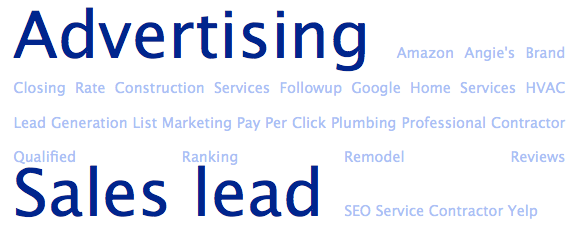By John Akhoian If you’ve talked to any business owner or critical manager over the past several years about the state of the home service industry, you will no doubt have heard about the ongoing labor shortage and its effects on productivity. Home service owners and managers have built training and retention programs to keep Read more
Industry Blogs

By John Akhoian
If you’ve talked to any business owner or critical manager over the past several years about the state of the home service industry, you will no doubt have heard about the ongoing labor shortage and its effects on productivity.
Home service owners and managers have built training and retention programs to keep their quality technicians well-educated and satisfied with their jobs. Some companies have begun offering apprenticeships again, while others have developed unique recruiting techniques in hopes of sparking an interest in the younger generation.
And beyond simply having enough employees to do the work, contractors know that having high-quality technicians helps drive a company’s productivity and profitability.
For most Americans, their home is their biggest investment, and they want to do business with well-trained and knowledgeable technicians. Having these high-quality technicians on staff is not only great for your home service company’s profitability, but it’s also essential to maintain consistent performance.

Trusting Your Team to Handle Critical Tasks
As a contractor, making sure your team performs to the best of its ability means that critical tasks will get done and won’t fall through the cracks.
One of the main reasons we hire employees is because we can’t handle all the business ourselves, but hiring a plumbing team is more than just putting bodies into trucks and customer homes.
A well-trained team is more likely to handle critical tasks with confidence. Having your team feel empowered to make decisions will result in them being able to take the initiative and respond more effectively to any plumbing issues.
It also helps if your team feels comfortable explaining technical details to customers so that homeowners understand the importance of preventative maintenance or the service they need.
This helps your team perform consistently, which means more satisfied customers. When a customer is happy, they will not only book repeat business but will also refer your company to their friends and family.
These referrals require your marketing team to make fewer touchpoints in order to drive new business. People tend to trust a family or friend’s referral over any advertising you can pay for. For example, a 2021 Nielsen survey about trust in advertising shows that 88% of consumers trust what their close family and friends say over advertising campaigns.
Boosting Revenue with Efficiency
As anyone with a new HVAC unit, automobile or washing machine knows, purchasing modern equipment can save your family money in the long run.
While regulations and innovation have made appliances more energy-efficient, you will need to consistently train your plumbers or HVAC technicians so they are up-to-date on the latest techniques. Plan training sessions during the shoulder month and divide the team up so that some are in the field while others are learning.
But training shouldn’t just be limited to teaching new repair and maintenance skills. You should also be teaching your home service experts some soft skills that they can use to provide better customer service. Your customer service representatives (CSRs) aren’t in the field with your service techs and aren’t there to answer questions.
That means your techs should know how to educate customers, upsell and cross-sell services, and ask customers for positive online reviews. Giving your techs the confidence to interact better with your customers is a great way to boost revenue.
You should also consider how you can use technology to help your service techs be more efficient, which saves them time. Not so long ago, your techs came to a customer’s home with the tools they needed to do the job but with little else.
These days, however, you have a variety of digital apps that not only make working in the field more efficient but can help your team be more efficient, including apps that:
- Prioritize tasks based on their level of expertise
- Minimize their travel time based on their starting location and list of service calls throughout the day
- Helps them provide more accurate estimates and modernizes invoices
- Assists in checking inventory to help schedule service.
Mentoring Their Peers
Finally, one of the best ways a home service company can improve its profitability is by utilizing the expertise of its more experienced service technicians.
On-the-job training is often necessary in professions where industry knowledge and constructive feedback can educate a new generation of workers. Partnering a younger employee with a more seasoned technician in the field has been a part of the skilled trades since the first indoor sink was a novelty.
But it doesn’t stop with technical advice. Older members of your team will be on hand to help younger technicians navigate career changes and provide guidance on professional development. If you are considering an apprenticeship program as a way to overcome the labor shortage, retaining your more experienced service techs to help with training is the best way to scale your business.
These collaborative efforts help your team build up a workforce that is more productive in the field because it reduces the number of mistakes, and younger workers get instant feedback so they can improve their skills.
Well-trained technicians equal happy customers. When your techs are trained well enough to feel comfortable answering customer questions, providing the right repairs and maintenance and building a customer’s trust through ongoing expertise and communication, you can drive more business.
As the labor shortage continues to loom over the home service industry, empowering your techs and plumbers with the right education and confidence gives you the competitive advantage you need to grow and scale your business.
 John Akhoian is CEO of Rooter Hero, a plumbing and drain company serving locations across California, Nevada and Arizona. His mission is to help others maximize their careers and live fulfilling, comfortable lives, and he is the author of several books about achieving success in business, including, “Creating 99 Millionaires” and “The Secret to Real Wealth.” He also published his autobiography, “Temporarily Broken: The John Akhoian Story” in 2022. For more information, visit www.rooterhero.com.
John Akhoian is CEO of Rooter Hero, a plumbing and drain company serving locations across California, Nevada and Arizona. His mission is to help others maximize their careers and live fulfilling, comfortable lives, and he is the author of several books about achieving success in business, including, “Creating 99 Millionaires” and “The Secret to Real Wealth.” He also published his autobiography, “Temporarily Broken: The John Akhoian Story” in 2022. For more information, visit www.rooterhero.com.

By Heather Ripley ‘Tis the season to be charitable. The holiday season often brings out our country’s most benevolent feelings, but it’s also a great time of year to publicize your company’s charitable donations. Many news outlets tend to focus on what local businesses are doing for the community as an example of the Christmas Read more
By Heather Ripley
‘Tis the season to be charitable.
The holiday season often brings out our country’s most benevolent feelings, but it’s also a great time of year to publicize your company’s charitable donations. Many news outlets tend to focus on what local businesses are doing for the community as an example of the Christmas spirit or as part of a year-in-review story.
As a plumbing contractor, you are looking for ways to stand out from your competition, and one way to do that is to publicize your company’s volunteer spirit.
Studies also show that younger generations take a company’s charitable giving into account when making purchasing decisions, and all generations look favorably at successful companies that give back to their community.
Here are three reasons why sharing information about your company’s altruistic programs can help you stand out from the crowd and heighten your reputation.

1. Attract Customers and Retain Talent
As a public relations professional, I speak to many business owners who feel like it’s self-serving to promote their own philanthropic efforts, but our agency highly recommends it, and here’s why: recent studies show that consumers want to know how businesses are supporting good causes. According to a YouGov poll, nearly half of consumers are more likely to buy from a brand that gives to a charity, while only 5% say they are less inclined to do so.
Given those odds, touting your efforts on your social media platforms, through press releases, and on your company’s blog will attract more customers who want to support businesses that care about the issues that are important to them.
In addition to consumer interest, most employees—65%—also prefer to work for companies that value social and environmental causes. Retention experts say that employees are happier when they work for a company that shares their personal values.
Collecting donations and offering volunteer opportunities boosts your employees’ morale and helps them connect with your company and its causes on a deeper level.
2. Boost Your Reputation
As a home service company, it’s imperative that you build trust in your community. Because you work with your customers in their most intimate settings, it’s important they have faith in your work and in your judgment.
By publicizing your philanthropic efforts, potential customers can see that you care. And, if your team also volunteers for activities to help the charities you’ve chosen to support, your company and its employees become more visible in the community.
This type of public relations (PR) associates your brand name with a cause and creates a positive image in the minds of consumers when they see your company name. A great example of this kind of PR is the Dawn Saves Wildlife campaign. As a result of news articles and an intense advertising campaign, people now associate the dish soap with the protection of wildlife after oil and chemical spills, and many consumers prefer to purchase that soap over others because they support the wildlife campaign.

3. Differentiate Your Company
If you’ve ever Googled your industry to see how many competitors you have in your local market, you are aware that you are probably one of several plumbing companies in your service area.
Most likely, their marketing teams are also producing door hangers, designing cool truck wraps, and are monitoring the Search Engine Optimization (SEO) on your website to attract customers. That’s why you need to do something to differentiate your company from your competition, and that “something” involves public relations.
If you have an effective PR partner, they can help you develop stories, social media and blog posts, and press releases about your company’s good deeds and will work to garner media interest in these efforts.
This not only gets you noticed by your local media, it also improves your standing on Google’s search results—the more times your company’s name appears in links outside of your website, the higher you’ll be listed in those results.
The bottom line is that you shouldn’t be afraid to showcase your philanthropic endeavors. But you need to do it tastefully. Building a solid PR campaign or working with a professional PR team can help you differentiate your company and celebrate your efforts while avoiding the pitfalls of sounding insincere.
 Heather Ripley is founder and CEO of Ripley PR, an elite, global public relations agency specializing in the franchising, skilled trades and B2B tech industries. Ripley PR has been listed by Entrepreneur Magazine as a Top Franchise PR Agency for seven consecutive years and was recently named as one of Newsweek’s America’s Best Public Relations Agencies for 2024. Heather Ripley was recently named as a 2024 PRNews Top Women honoree in the business entrepreneur category, and she was recently named as ACHR NEWS’ Top Women in HVAC. She is also the author of “NEXT LEVEL NOW: PR Secrets to Drive Explosive Growth for your Home Service Business,” which is now available on all audiobook platforms. For additional information, visit www.ripleypr.com.
Heather Ripley is founder and CEO of Ripley PR, an elite, global public relations agency specializing in the franchising, skilled trades and B2B tech industries. Ripley PR has been listed by Entrepreneur Magazine as a Top Franchise PR Agency for seven consecutive years and was recently named as one of Newsweek’s America’s Best Public Relations Agencies for 2024. Heather Ripley was recently named as a 2024 PRNews Top Women honoree in the business entrepreneur category, and she was recently named as ACHR NEWS’ Top Women in HVAC. She is also the author of “NEXT LEVEL NOW: PR Secrets to Drive Explosive Growth for your Home Service Business,” which is now available on all audiobook platforms. For additional information, visit www.ripleypr.com.

By Josh Koplin The Anticipation Advantage We’re talking about neuroscience—yes, neuroscience. What do the inner workings of the human brain have to do with getting a great deal, whether that means getting the perfect Black Friday TV or, believe it or not, an HVAC system? Plenty, as it turns out. Picture the scene: You’re hovering Read more
By Josh Koplin
The Anticipation Advantage
We’re talking about neuroscience—yes, neuroscience.
What do the inner workings of the human brain have to do with getting a great deal, whether that means getting the perfect Black Friday TV or, believe it or not, an HVAC system? Plenty, as it turns out.
Picture the scene: You’re hovering over the “add to cart” button, waiting for that sale price to drop. Your heart isn’t racing once you’ve already snagged the big screen—it’s pounding right before, in that sweet spot of maybe. Anticipation, not fulfillment, is where the brain’s real fireworks happen.
Humans aren’t just driven by rewards; we’re propelled by their promise. It’s the inkling that we might get a killer price, might outsmart the market, might score something special that sends dopamine shooting through our neural pathways.
Consider a gambler at a craps table—dopamine doesn’t spike when they win, it elevates when the dice are suspended midair when that big win is possible. Dopamine, often described as the “pleasure” chemical, is more like the chemical of “maybe:” the neurochemical of anticipation that something great could be right around the corner.

The Neuroscience of HVAC: Turning Necessity Into Opportunity
Now, let’s apply this to a less thrilling scenario for most consumers: buying an HVAC system.
For most homeowners, replacing a furnace or adding central air is about as glamorous as scheduling a dentist appointment. But even a mundane necessity sparks more interest if it feels like a deal. Consider a high-efficiency heat pump listed at $20,000. At face value, that might send the would-be buyer running. Toss in a $2,000 tax credit, a $1,500 local utility rebate, and a $1,000 seasonal manufacturer promotion, and suddenly that total drops by $4,500.
With each discount line item, the buyer’s brain perks up, anticipating that sweet sense of winning the pricing game.
Neuroscientists have shown that bigger potential rewards translate into stronger activation in the brain’s reward pathways. A modest discount is nice, but shaving thousands off the bill? That’s the kind of number that lights up the mental scoreboard. On the flip side, if someone encounters a price they deem “unfair,” the insula region of their brain—a center associated with pain and disgust—flares into action, pushing them away from the purchase.
This is where strategy comes in: By pairing substantial incentives with financing options that display monthly costs, you can dampen that insula response. Instead of seeing one large upfront sum, the homeowner sees a more approachable monthly figure, say $140 per month. This shift reframes the deal as manageable and less painful, keeping dopamine flowing rather than triggering the insula’s alarm bells.
Make Savings Obvious and Immediate
So how do you put all this brain science into play? Start at your homepage. Forget paragraphs of backstory—your visitor wants an instant reason to hang around. Parade those incentives right out front:
- Federal tax credit: up to $2,000
- Local utility rebate: up to $1,500
- Seasonal promotion: $1,000 off
These aren’t just figures; they’re brain candy. Even if the homeowner isn’t ready to buy on the spot, their brain is already logging these potential savings. They’re thinking, “Hey, I might get a really good deal here,” and that anticipation breeds motivation.
Speed Is Key: The Power of Online Quotes
Once you’ve laid out the incentives, don’t let the momentum slip away.
As consumers, we’re overwhelmed by stimuli vying for our attention and more easily distracted than ever. The longer it takes to get a clear price, the more likely it is that the customer will lose interest and the initial dopamine surge will drain. Online quoting tools are a powerful solution: A homeowner punches in a few details—location, home size, desired system—and gets an estimate in seconds.
Show the final figure and the incentives, then break it down into a monthly payment. What’s more, online transparency cultivates trust and makes customers more likely to reach out. Watch their interest climb.

From Online Curiosity to Kitchen Table Commitment
Now, all of this might seem like just putting science to what good salespeople and marketers already know. And that’s exactly the point. The difference now is the battlefield.
Homeowners increasingly start their search online, poking around in off-hours, maybe with the TV on mute and a phone in hand. Before they ever sit down at the kitchen table to hear your pitch, they’re testing the waters online. In a competitive market humming with options, it’s more important than ever to hit those reward circuits when consumers browse, in order to make sure that you earn a seat at the kitchen table.
So yes, HVAC sales and neuroscience make an odd couple at first glance. But a bit of neuroscientific insight and online strategy just might just be the difference between a lead bouncing away versus and getting to that kitchen table with a “yes, let’s do this.”
 Josh Koplin is a co-founder of EDEN, a Seattle-based startup with a mission to empower contractors with innovative technology, helping them to grow their businesses and provide exceptional customer experiences. Founded in 2021, EDEN provides a digital sales enablement tool to help HVAC contractors provide quick and accurate instant quotes for HVAC systems. By leveraging technology to provide prices and detailed breakdowns of eligible incentives and expected utility savings online, EDEN helps promote high-efficiency systems that contribute to sustainability and benefits both homeowners and contractors. For more information, visit https://www.e-denhomes.com/.
Josh Koplin is a co-founder of EDEN, a Seattle-based startup with a mission to empower contractors with innovative technology, helping them to grow their businesses and provide exceptional customer experiences. Founded in 2021, EDEN provides a digital sales enablement tool to help HVAC contractors provide quick and accurate instant quotes for HVAC systems. By leveraging technology to provide prices and detailed breakdowns of eligible incentives and expected utility savings online, EDEN helps promote high-efficiency systems that contribute to sustainability and benefits both homeowners and contractors. For more information, visit https://www.e-denhomes.com/.

By Lynn Wise Anyone who has ever had a furnace break down because of a complex issue knows that there comes a time when you must hire an expert. While most of us know how to change the filter on the HVAC system, we don’t really know that much about what makes a furnace tick Read more
By Lynn Wise
Anyone who has ever had a furnace break down because of a complex issue knows that there comes a time when you must hire an expert. While most of us know how to change the filter on the HVAC system, we don’t really know that much about what makes a furnace tick.
And, while you may be that HVAC expert or own a company that employs these HVAC experts, you may not be the authority in accounting or on call center management.
One way that you can boost your business is to hire the experts you need to handle your accounting or call center by outsourcing these roles to the experts. Instead of spinning your wheels trying to hire and train the right people to do these jobs, you can employ a skilled and trained team to manage these roles for you so you can focus on retaining your plumbers, electricians or HVAC techs and growing your business.

Outsourcing by the Numbers
As a home service company owner, you know how difficult it is to hire qualified technicians. The cost to recruit, train and retain your staff is probably one of your biggest expenses next to payroll and insurance.
But it is also becoming increasingly difficult to hire degreed and qualified accounting specialists, too. According to The CPA Journal, the accounting profession is facing a shortage of accountants, making it just as difficult to find the right team to manage your books.
By outsourcing your accounting team, you no longer have to take the time to recruit and hire someone with a skill that typically you do not know how to train. Bookkeeping and/or accounting skills are skillsets that require specific training to be competent. Your business will save itself the cost of paying for a full-time accounting team, and you don’t have to provide benefits.
If you hire a skilled and trained accounting service provider, you will also get access to experts who know how to manage your books. These providers do all of the recruiting and training and are also experts in finding the best accounting professionals.
In addition, outsourcing your accounting team allows you to scale your business based on your current and future requirements. The right professional knows your operations and therefore understands your workflows to enable correct recording of transactions in your financial files. For example, you won’t need to over hire full-time accountants so that you’ll have a big enough team to handle duties during your busier seasons. In the past, you’d need to take the time to hire temporary workers or you’d have to pay your team overtime during the busy season, which can cause burnout and turnover.
This makes outsourcing your accounting functions more cost-effective. It also allows you more time to spend on recruiting the skilled tradesmen you need to grow your business and take on more customers or provide more services.
Calling on the Professionals
But accounting isn’t the only way you can save money while scaling your business.
Outsourcing your call center is another way to get the professional help you need while saving you time since you will no longer need to consistently hire and train a fully-functioning call management team.
Like outsourcing your accounting department, contracting with a professional call center team can help you save money on salaries, benefits and infrastructure. But it can do so much more. This includes:
- Providing you with an expert team. Third-party call center management companies not only hire experts in customer service, they also provide all the training so that your call center team understands how to improve the customer experience.
- Giving you access to the latest technology. The best call center management companies provide their teams with the latest tools to access the data they need to answer calls professionally. These companies also invest in the latest call center technology, including telephony and artificial intelligence-powered chatbots.
- Allowing you to scale your business. Many call center management companies offer 24-hour, 7-day-a-week services so that you can extend your hours or provide better service during peak periods.
- Providing you with quality control. These companies also provide better monitoring so they can see where their teams need additional training. This not only improves customer service interactions but provides you with the analytics you need to determine where to improve your company’s customer experience.
Outsourcing your back office and call center teams provides you with instant access to skillsets you would never be able to afford individually, and gives you back the time you need to focus on your primary business operations.
Dreaming to Scale
Imagine being able to have the time to train more plumbers, electricians or HVAC technicians while having the accounting and call center support you need to quickly grow your business.
Contracting out these services can be a boon for the smaller home service business owner. As you work to grow your business, it is imperative that you have enough work for your current number of technicians, as well as a plan to hire more as you gather more clients. This can be tricky, especially during the shoulder months when repair and installation work slows down.
Outsourcing these employees also allows you to provide more complex solutions for your existing customer base and the scalability to grow on an as-needed basis. In other words, you’ll no longer be paying salaries for people who don’t have enough work during the slower times or burning out your employees when there is too much work during the busier seasons.
Choosing the right accounting or call center management partner can help you streamline your business. It can free up your cashflow to pay your critical managers and top talent more so you can retain the best employees, while also freeing up your time to recruit, hire and train new talent so you can grow your business to the level you’ve always dreamed about.
 Lynn Wise is the founder of Contractor in Charge, a company offering organizations services such as accounting, dispatch and customer service representatives for the home service industry. She is also the author of “Build It, Grow It, Sell It! Nine Steps to a Thriving Contracting Business.” Wise has spent the last 35 years as the successful owner of multiple small businesses, including a plumbing and heating repair company and a remodeling company.
Lynn Wise is the founder of Contractor in Charge, a company offering organizations services such as accounting, dispatch and customer service representatives for the home service industry. She is also the author of “Build It, Grow It, Sell It! Nine Steps to a Thriving Contracting Business.” Wise has spent the last 35 years as the successful owner of multiple small businesses, including a plumbing and heating repair company and a remodeling company.

By Ronda Chaney Imagine you’re about to embark on the trip of a lifetime. Your destination is crystal clear — you can practically feel the sun on your face as you picture yourself relaxing at the end of the journey. But there’s a catch: You’ve got no map. No directions, no guide, just a vague Read more
By Ronda Chaney
Imagine you’re about to embark on the trip of a lifetime. Your destination is crystal clear — you can practically feel the sun on your face as you picture yourself relaxing at the end of the journey. But there’s a catch: You’ve got no map. No directions, no guide, just a vague idea of where you want to end up. Without a plan, you’re left guessing at every turn, risking delays, frustration, and failure.
Now, think about your business. Are you approaching it the same way? You might have a vivid vision of success — like the view from that dream vacation home — but how will you actually get there without a concrete business plan?

Developing a Plan
A business plan isn’t just a checkbox or a formality — it’s the backbone of long-term success and stability. As the saying goes, “Failing to plan is planning to fail.” So, how do you craft a plan that drives your business forward? And how can you do it quickly and efficiently?
At its core, a business plan is about setting clear goals and identifying the strategies and actions needed to achieve them. But it’s more than just a to-do list. It requires owners and operators to take a hard look at their business’s strengths, weaknesses, opportunities, and threats. This honest evaluation comes from digging into past data across key areas like operations (staffing, equipment, inventory, workflows, technology), training (installation, service, sales), finances (startup costs, revenue projections, cash flow), and marketing (industry trends, target audience, competitors).
Once you’ve established benchmarks in these areas, the real work begins. Use this data to set ambitious goals and create a roadmap for success — a detailed, step-by-step guide for how to reach your destination. Though the process may seem overwhelming, breaking it down into small, manageable actions makes it more achievable. And don’t forget to celebrate each win, no matter how small — it’s all progress.
Strategic Financial Plan
While your business plan steers every decision, your financials serve as the high-octane fuel propelling your progress. Therefore, effective money management is essential for ensuring smooth sailing.
Consider the lessons of the past. Business owners must take a reflective journey before forging ahead. Analyzing financial performance — revenue, operating costs, or cash flow — provides crucial insights that inform future planning and decision-making.
When crafting your financial plan, begin with the end in mind. Visualize where you want your business to be in one year, two years, or even a decade. Establish financial milestones along this journey; these long-term goals will act as your guiding stars, illuminating the path ahead.
Next, develop an action plan that paves the path to achievement. What specific steps does your team need to implement weekly, monthly, or quarterly to reach these objectives? Emphasize that everyone plays a vital role in the process and establish personalized goals for each team member, as one missed individual goal can significantly impact the team’s overall success.
Establish deadlines and communicate your commitment to meeting these targets. Without timelines, even the best strategies can lose momentum.
Once your plan is underway, set key performance indicators (KPIs) to monitor progress regarding profit margins, cash flow, customer retention rates, etc. Regularly reviewing such KPIs ensures your decisions are informed by data, keeping you agile and reactive.
As you reach each milestone, take time to assess your progress. If you find yourself veering off course, don’t hesitate to pivot; adaptability is just as vital as foresight — it’s easier to redirect your progress after one wrong turn rather than several.
Finally, embrace the journey with a willingness to learn and adjust. Getting there is half the fun!
Your journey to success comes from taking a series of small steps. At each milestone, you’ll gain valuable insights that will guide you forward. So, buckle up, strategize your route, and steer your business accordingly. With a solid plan and unwavering commitment, your destination is within reach.
 Ronda Chaney is a head coach and trainer for Business Development Resources (BDR), the premier business training and coaching provider to HVAC contractors and distributors. She started her business management career in 2000 and entered the HVAC industry in 2009. Chaney’s career has included several tactical and strategic positions spanning administrative, sales, customer service, and departmental and division-level management roles.
Ronda Chaney is a head coach and trainer for Business Development Resources (BDR), the premier business training and coaching provider to HVAC contractors and distributors. She started her business management career in 2000 and entered the HVAC industry in 2009. Chaney’s career has included several tactical and strategic positions spanning administrative, sales, customer service, and departmental and division-level management roles.
